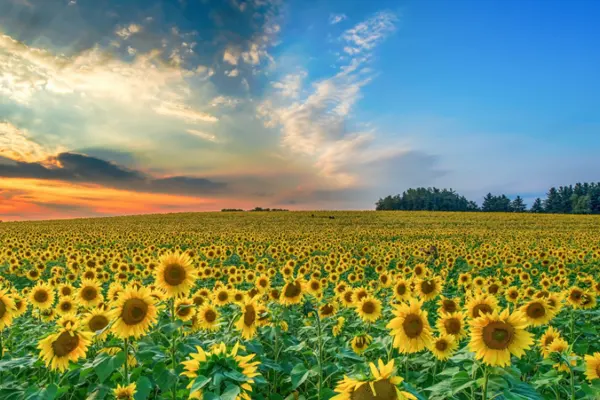On the 24th February a video of a Ukrainian woman confronting Russian soldiers appeared on Twitter; the video, which has now been viewed more than 8 million times, shows the woman, Henychesk, giving sunflower seeds to the Russian soldiers, with the striking instruction to put the seeds in their pockets so that the flowers will grow where they die. It doesn’t make for easy viewing; firstly, we are united in our sense of despair as Putin’s army occupies Ukraine, but also because it reminds us of the absolute futility of war; when man makes war against man there are no winners. This feels particularly true as it seems the war is not the will of the Russian people and more information about Putin’s tactics are made public.
According to an article in Time magazine, by Olivia B. Waxman, dated 4 th March, the sunflower has a very long history in Ukrainian history. Sunflowers—soniashnyk in Ukrainian—have been grown since the mid-18th century according to a 1993 Encyclopedia of Ukraine. At the time of the book’s publication, sunflower seeds were the country’s most popular snack. The flower also helps fuel the national economy today; Ukraine and Russia supply up to 70–80% of the world’s sunflower oil exports. The presence of the flowers across the whole of Ukraine have led to it being seen as an unofficial national flower and in June 1996 to celebrate Ukraine giving up nuclear weapons, U.S., Russian and Ukrainian defence ministers planted sunflowers in a ceremony at southern Ukraine’s Pervomaysk missile base.
Because of this history the sunflower is worn by those wishing to show solidarity with the Ukrainian people and as a symbol of peace. The bible says this,
“Those who make peace sow the seeds of justice by their peaceful acts.” — James 3:18.
When we watch the news reports it can feel overwhelming, we don’t know how to help, what words to use when we pray, or even to understand what we are seeing unfold in front of us. But we do have a role to play. As Christians we believe God does hear our prayers and we know that the people of Ukraine receive some comfort from knowing that their stories are being shared and their plight is being witnessed. We are told that money is the best aid we can give and there are so many channels we could use; the Disasters Emergency Committee is made up of the 15 UK leading charities including TearFund for which Whittington resident Ian Orton works. All these charities have teams working on the ground to get aid to where the need is most desperate.
Just as the poppy is used now as a symbol of peace and a reminder of a war that once was, we pray the same for the sunflower, that one day it will be seen again growing abundantly across Ukraine and Russia; its big yellow head a sign of peace and of nations united in justice for all.
Every Blessing
Suzan
